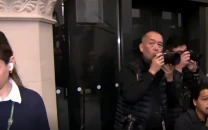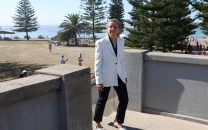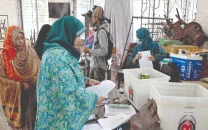Why might Syria's regime have dropped toxic gas on Ghouta?
The tactic worked, and Assad will soon rule over Douma

The tactic worked, and Assad will soon rule over Douma
PHOTO: AFP
Rescuers and medics said Saturday's alleged toxic attack killed at least 40 people in the last opposition holdout of Douma and left hundreds with symptoms consistent with those of exposure to a chemical agent.
Global outrage has mounted and the United States has threatened to take punitive action, but it has not been possible to independently verify the reports.
Analysts say the regime might have chosen to carry out a chlorine attack to avoid any further heavy losses among its troops and to ensure militant group Jaish al-Islam left Douma under terms set by Damascus.
"Rather than go deep into Douma and get bloodied badly, a chemical weapons attack was used to sow terror among the population from which Jaish al-Islam draws support," Syria analyst Nick Heras said.
"The tactic worked, and Assad will soon rule over Douma," said the analyst at the Center for New American Security.
President Bashar al-Assad has retaken control of almost all of Eastern Ghouta since mid-February, but until last week militants in the final pocket of Douma determinedly refused to withdraw.
After the alleged chemical attack, the regime said a deal had been reached for Jaish al-Islam fighters to leave the bombed-out town.
Retaking control of Eastern Ghouta would be a major victory for Assad in Syria's seven-year war, which has killed more than 350,000 people and displaced millions.
It would free up pro-government forces to expel opposition fighters from other parts of the country, including the northwestern province of Idlib and the southern area of Daraa, and make the capital Damascus secure.
"Assad needs every operation to be low casualties, or his army will not have the numbers to move on any other rebel controlled areas," Heras said.
The Damascus regime and key ally Russia have both rejected any use of toxic substances as 'fabrications'.
"The army, which has progressed rapidly and with determination, does not need to use any chemical substance," an official source told state news agency SANA after the reported attack.
Regime backer Iran has said that "with the Syrian army having the upper hand on the ground against the armed terrorists, it would not be rational for it to use chemical weapons".
On Tuesday, the Organisation for the Prohibition of Chemical Weapons said it would soon deploy a team to Douma after Damascus said it was "ready to provide all necessary assistance to the mission".
Assad's regime has regained 95 per cent of Eastern Ghouta through a combination of an aerial blitz, ground battles and Russia-brokered evacuation deals, a Britain-based monitor says.
More than 1,700 civilians have lost their lives since Russia-backed regime forces launched their blistering assault on February 18, the Syrian Observatory for Human Rights has said.
Analyst Faysal Itani says regime forces might have chosen to use a chemical weapons in Douma as a "battlefield tactic" to secure "what to them is the most important geography of the war".
"They were faced with the prospect of a very ugly extended fight in this built-up area against a pretty tough and experienced enemy - Jaish al-Islam - or using chemical weapons," he said.
As a tactic, the second "works quite well in breaking morale and causing panic behind front lines", said the resident senior fellow at the US-based Rafik Hariri Center for the Middle East.
Western countries may have repeatedly warned that evidence of Damascus using chemical weapons is a "red line" that will trigger fierce consequences, but Itani says their actions so far have been limited.
In April last year, US President Donald Trump launched a cruise missile strike against a Syrian air base after a previous toxic attack UN investigators later pinned on Assad's regime.
But that did little to dent Assad in the longer-term and there has been no international military response to a string of other alleged toxic attacks of which the regime has since been accused.
For any regime forces planning a gas attack, "their worst case calculation is that there will be another limited targeted US strike against something and then the world will move on", Itani said.
The actions so far of the United States and other Western countries have told Assad that "at the end of the day he's going to be allowed to retake the country and survive politically", he said.



















COMMENTS
Comments are moderated and generally will be posted if they are on-topic and not abusive.
For more information, please see our Comments FAQ